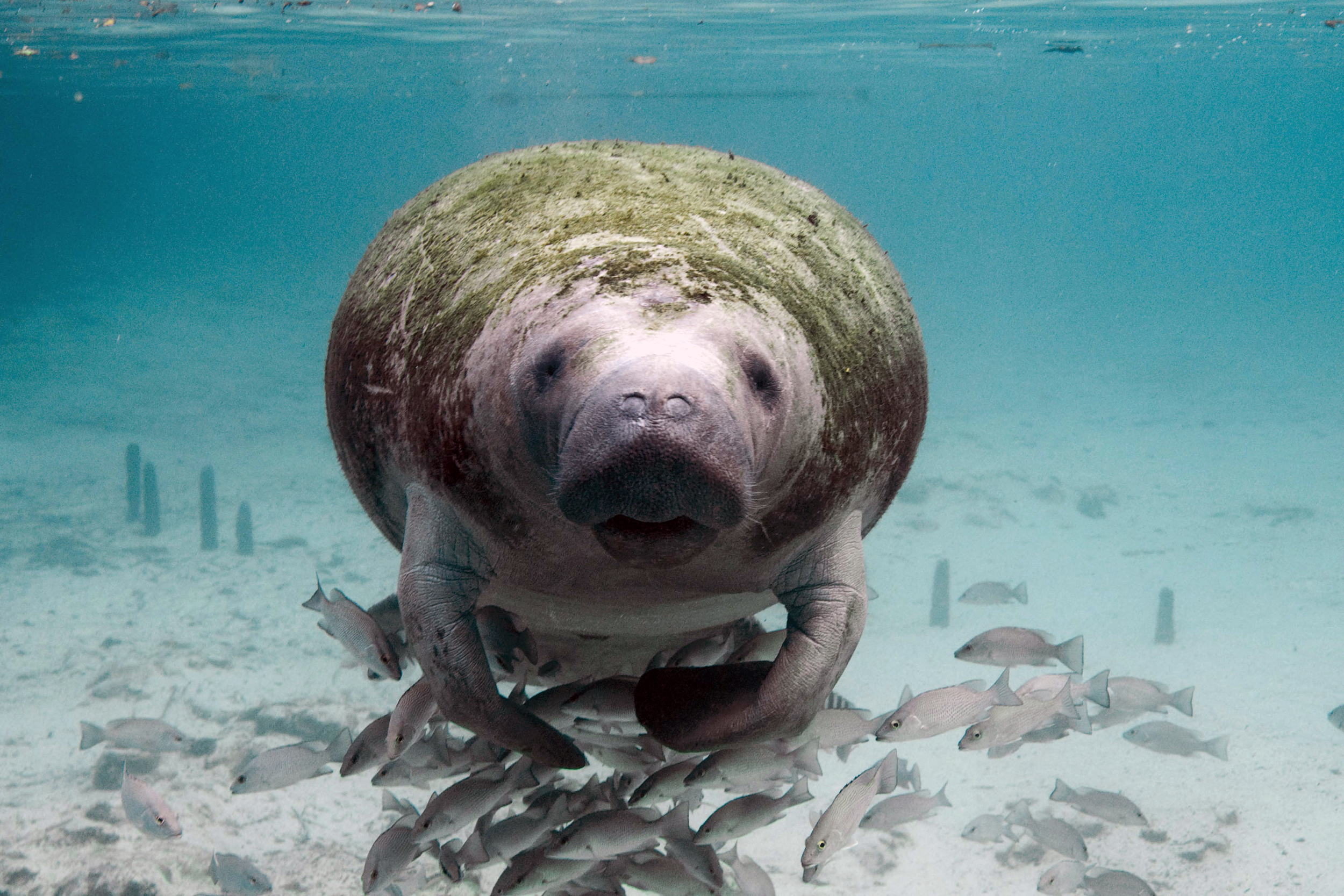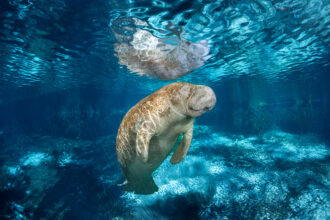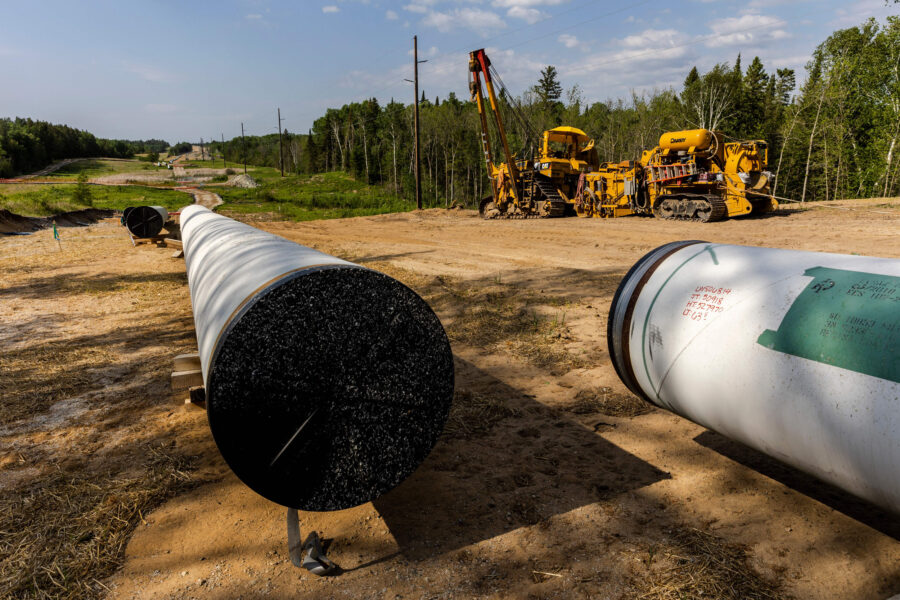The Trump administration’s government-wide staff cuts threaten federally protected manatees in a Florida national wildlife refuge established for the purpose of safeguarding the beloved sea cows, according to a new legal filing from the Center for Biological Diversity.
The administration is accused of imperiling the manatees by failing to adequately staff the Crystal River National Wildlife Refuge. The refuge, situated 80 miles north of Tampa, provides essential winter habitat for some 20 percent of the state’s population, according to a 60-day notice of intent to sue the advocacy group filed Friday.
The refuge was chronically understaffed before the Trump administration in February dismissed two of the eight employees tasked with managing five national wildlife refuges along Florida’s Gulf Coast, including Crystal River, according to the legal filing. The fired employees were reinstated under a court order, but the document argues the administration’s commitment to more cuts represents an ongoing threat to the manatees.
“It’s clear that the administration’s goal is to further reduce the workforce,” said Ragan Whitlock, staff attorney at the Center for Biological Diversity. “We are taking a stand now to make clear that that is unacceptable, that any attacks on federal employees are also attacks on the species and habitats they are directed to preserve.”
The Crystal River National Wildlife Refuge is known for its boat tours, provided by outside operators under permit, that offer an opportunity to swim with the manatees. The tours, while popular, have stressed the animals, as unscrupulous swimmers have grabbed, walked on and ridden the manatees, even separating a mother from her calf, according to the legal filing. The harassment prompted then-manager Michael Lusk to call on the U.S. Fish and Wildlife Service in 2014 to close the springs within the refuge while manatees were present, until resources could be found to ensure the animals’ safety.
The legal filing argues the refuge already lacks the staff to effectively manage the commercial boat tour operators along with thousands of visitors who converge on the preserve every winter to see the cold-sensitive manatees, which rely on the springs for warmth. The document suggests the refuge’s importance is poised to grow as power companies transition away from fossil fuels in order to combat climate change, diminishing the artificially warm waters around power plants that manatees rely on during the winter.
The legal filing calls on the Trump administration to hire more staff at the Crystal River National Wildlife Refuge or restrict activities at the refuge until it can be adequately staffed. It names as defendants Doug Burgum, secretary of the Department of the Interior; Paul Souza, acting director of the Fish and Wildlife Service; and Amy Gleason, acting administrator of the Department of Government Efficiency. The Department of the Interior and the Fish and Wildlife Service declined to comment on pending litigation.
“President Trump has the authority to manage personnel within the executive branch. The President prioritizes both economic and environmental stewardship, ensuring the Florida manatees are healthy while effectively using taxpayer dollars,” said Taylor Rogers, White House assistant press secretary, in a statement provided to Inside Climate News. “The Unusual Mortality Event from starvation due to seagrass loss affecting manatees along Florida’s East Coast was administratively closed in March.”
The Florida manatee is a subspecies of the West Indian manatee, which was downlisted from endangered to threatened under the Endangered Species Act in 2017, sparking widespread outcry. The Fish and Wildlife Service proposed in January listing each manatee subspecies separately, with the Florida manatee retaining its threatened status and the Antillean manatee, which lives farther south in the Caribbean, regaining its endangered listing.
Nearly 2,000 manatees died in Florida in 2021 and 2022, a two-year record. The calamity was related to water quality problems. Manatees also are vulnerable to boat strikes, entanglement in fishing gear and ingestion of marine debris.
This story was updated on June 3 to include comments from the White House.
About This Story
Perhaps you noticed: This story, like all the news we publish, is free to read. That’s because Inside Climate News is a 501c3 nonprofit organization. We do not charge a subscription fee, lock our news behind a paywall, or clutter our website with ads. We make our news on climate and the environment freely available to you and anyone who wants it.
That’s not all. We also share our news for free with scores of other media organizations around the country. Many of them can’t afford to do environmental journalism of their own. We’ve built bureaus from coast to coast to report local stories, collaborate with local newsrooms and co-publish articles so that this vital work is shared as widely as possible.
Two of us launched ICN in 2007. Six years later we earned a Pulitzer Prize for National Reporting, and now we run the oldest and largest dedicated climate newsroom in the nation. We tell the story in all its complexity. We hold polluters accountable. We expose environmental injustice. We debunk misinformation. We scrutinize solutions and inspire action.
Donations from readers like you fund every aspect of what we do. If you don’t already, will you support our ongoing work, our reporting on the biggest crisis facing our planet, and help us reach even more readers in more places?
Please take a moment to make a tax-deductible donation. Every one of them makes a difference.
Thank you,













